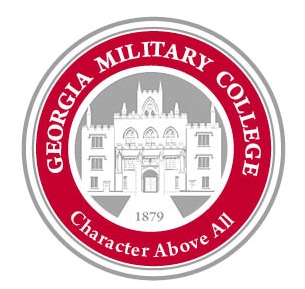The Quality Enhancement Plan (QEP)
The Quality Enhancement Plan (QEP)

QEP GOAL:
Georgia Military College will provide an atmosphere where students will improve their ability to think critically.
What is the plan to reach the goal and outcomes? How will the student-learning outcomes be measured?

What is the plan to reach the goal and outcomes? How will the student-learning outcomes be measured?
PER 101 will be a course that introduces incoming freshman students to metacognition and the five reasoning skills (induction, deduction, inference, analysis, and evaluation). Students in this course will take a metacognition pretest and a critical thinking pretest to assess their understanding of these skills upon entering GMC.
Twelve core 100-level courses will be enhanced with critical thinking lessons/activities that cover at least one of the five reasoning skills. Understanding and application of critical thinking will be measured over these assignments using the AAC&U critical thinking VALUE rubric.
PER 201 will be a capstone course that is taken after completion of PER 101, PLS 101, and ENG 102. The curriculum will focus on critical thinking, metacognition, and the five reasoning skills. Students in this course will take a metacognition posttest, critical thinking posttest, and the Test of Everyday Reasoning (TER). The posttests will show how the students’ critical thinking and metacognitive skills improved over their first year at GMC, while the TER will show how GMC students’ critical thinking skills compare to national data.
How can staff and administrators assist in the QEP initiative?

Be aware of our plan and what the students need to know. Understand the 5 reasoning skills and what they mean, metacognition, and our definition of critical thinking.
5 Reasoning Skills
Analysis – identify assumptions, reasons and claims, and examine how they interact in the formation of arguments. Individuals use analytics to gather information from charts, graphs, diagrams, spoken language and documents. People with strong analytical skills attend to patterns and to details. They identify the elements of a situation and determine how those parts interact. Strong interpretations skills can support high quality analysis by providing insights into the significance of what a person is saying or what something means.
Inference – draw conclusions from reasons and evidence. Inference is used when someone offers thoughtful suggestions and hypothesis. Inference skills indicate the necessary or the very probable consequences of a given set of facts and conditions. Conclusions, hypotheses, recommendations or decisions that are based on faulty analysis, misinformation, bad data or biased evaluations can turn out to be mistaken, even if they have reached using excellent inference skills.
Evaluation – assess the credibility of sources of information and the claims they make, and determine the strength and weakness or arguments. Applying evaluation skills can judge the quality of analysis, interpretations, explanations, inferences, options, opinions, beliefs, ideas, proposals, and decisions. Strong explanation skills can support high quality evaluation by providing evidence, reasons, methods, criteria, or assumptions behind the claims made and the conclusions reached.
Deduction – decision making in precisely defined contexts where rules, operating conditions, core beliefs, values, policies, principles, procedures and terminology completely determine the outcome. Deductive reasoning moves with exacting precision from the assumed truth of a set of beliefs to a conclusion which cannot be false if those beliefs are untrue. Deductive validity is rigorously logical and clear-cut. Deductive validity leaves no room for uncertainty, unless one alters the meanings of words or the grammar of the language.
Induction – decision making in contexts of uncertainty. We use inductive reasoning skills when we draw inferences about what we think is probably true based on analogies, case studies, prior experience, statistical analysis, simulations, hypotheticals, and patterns recognized in familiar objects, events, experiences and behaviors. As long as there is the possibility, however remote, that a highly probable conclusion might be mistaken even though the evidence at hand is unchanged, the reasoning is inductive. Although it does not yield certainty, inductive reasoning can provide a confidence basis for solid belief in our conclusions and a reasonable basis for action.
GMC’s Definition of Critical Thinking

Active, self-reflective, and deliberate attempt to utilize cognitive skills to support decision making, problem solving, or mastery of concepts throughout various contexts.
What is Metacognition?
Metacognition: Thinking about your own thinking!
Takes thought and effort, but improves student learning. Metacognition and critical thinking complement each other and are hard to separate when teaching students how to become deliberate critical thinkers. Metacognition may be the first stepping-stone for students walking toward this goal.
See our next guest speaker discuss metacognition HERE.
FAQ:


What is the QEP?
The Quality Enhancement Plan (QEP) is required by SACSCOC Core Requirement 2.12 that states:
The institution must develop an acceptable QEP that:
- Includes a broad-based institutional process identifying key issues emerging from institutional assessment
- Focuses on learning outcomes and/or the environment supporting student learning and accomplishing the mission of the institution
- Demonstrates institutional capability for the initiation, implementation, and institutional constituencies in the development and proposed implementation of the QEP
- Includes broad-based involvement of institutional constituencies in the development and proposed implementation of the QEP
- Identifies goals and a plan to assess their achievement


Why is the QEP important?
“The Quality Enhancement Plan (QEP) is the component of the accreditation process that reflects and affirms the commitment of the Commission on Colleges to the enhancement of the quality of higher education and to the proposition that student learning is at the heart of the mission of all institutions of higher learning.”
For Georgia Military College, “developing a QEP as a part of the reaffirmation process is an opportunity to enhance overall institutional quality and effectiveness by focusing on an issue or issues the institution considers important to improving student learning.”
What is the GMC QEP topic?
The Georgia Military College’s Quality Enhancement Plan focuses on assessment of student learning and faculty professional development to improve students’ critical thinking abilities and skills.


How did GMC develop its QEP topic?
Georgia Military College has five core competencies, of which critical thinking is one. In the spring of 2013, the QEP committee did an open survey explaining that the college was selecting the next topic to improve student learning. Based on the information gathered from faculty, staff, and students, the QEP committee narrowed the topics to six areas: Critical Thinking, Oral Communication, Written Communication, Problem Solving, Information Literacy, and Teamwork. QEP committee members wrote problem statements for each of these six areas, and using these statements, the QEP committee conducted two surveys sent to 1) faculty, staff, students, and 2) alumni and other stakeholders. The results from both surveys indicated that the stakeholders felt that critical thinking was the most important area that needed improvement.


What is the scope of the QEP committee?
The scope of the QEP committee ranges from establishing the topic to evaluating the progress and outcomes as follows:
- Addresses significant student-learning issues
- Includes QEP goals that relate to student learning
- Defines “intended benefits of the QEP to the institution and to the student”
- Ensures “resources (personnel, financial, physical, academic, etc.) necessary for the successful implementation of the QEP”
- Monitors the QEP progress
- Evaluates the QEP to ensure success and to improve student learning


What are the GMC QEP goals, objectives, and outcomes?
GOAL: Georgia Military College will provide an atmosphere where students will improve their ability to think critically.
OBJECTIVES:
- GMC Stakeholders (Students, Faculty, Academic Support Staff, and Administration) will demonstrate knowledge of metacognition, critical thinking, and the five reasoning skills.
- Faculty will participate in professional development in metacognition, critical thinking, and the five reasoning skills.
- Students will employ metacognitive skills, critical thinking, and the five reasoning skills through the college curriculum and through student services.
OUTCOMES:
- Stakeholders will be able to:
- Define metacognition and critical thinking.
- Identify and describe the five reasoning skills.
- Faculty will be able to:
- Appraise their thinking skills and processes (metacognition).
- Apply critical thinking and the five reasoning skills.
- Students will
- Appraise their thinking skills and processes (metacognition).
- Demonstrate their ability to think critically and apply the five reasoning skills.


What is the plan to reach the goal and outcomes? How will the student-learning outcomes be measured?
PER 101 will be a course that introduces incoming freshman students to metacognition and the five reasoning skills (induction, deduction, inference, analysis, and evaluation). Students in this course will take a metacognition pretest and a critical thinking pretest to assess their understanding of these skills upon entering GMC.
Twelve core 100-level courses will be enhanced with critical thinking lessons/activities that cover at least one of the five reasoning skills. Understanding and application of critical thinking will be measured over these assignments using the AAC&U critical thinking VALUE rubric.
PER 201 will be a capstone course that is taken after completion of PER 101, PLS 101, and ENG 102. The curriculum will focus on critical thinking, metacognition, and the five reasoning skills. Students in this course will take a metacognition posttest, critical thinking posttest, and the Test of Everyday Reasoning (TER). The posttests will show how the students’ critical thinking and metacognitive skills improved over their first year at GMC, while the TER will show how GMC students’ critical thinking skills compare to national data.


How will faculty and staff be involved?
aculty and/or academic support staff will be the facilitators of the critical thinking enhancement in core classes at GMC in support of the QEP. Over a 4-year period, the faculty will undergo professional development to incorporate critical thinking into their classrooms efficiently and effectively. Each division has selected their own courses to enhance with critical thinking and will design lessons and assignments for the students to expose them to, and enhance their abilities in, critical thinking.


What is the GMC QEP timeline?
- Obtain approval of our QEP by SACSCOC during their on-site visit: September 2016.
- Implement our QEP: October 2016 – May 2021.
- Complete QEP 5th Year Impact Report: Summer 2021.


Who should I contact if I have questions or want to be involved with the QEP?
Kara Maddox
QEP Committee Chair
kjensen@gmc.edu
Quality Enhancement Plan (QEP)
Education and Resource Files


QEP Taskforce
CT Expert Training Packet
Meeting Minutes
- April 2013
- September 2013
- January 2014
- May 2014
- August 2015
- October 2015
- November 2015
- January 2016
- April 2016
- August 2016


QEP Plan


GMC QEP Report


QEP Newsletters
Academic Excellence.
Since 1879.
We’ve been educating bright minds for well over a century. That’s why a degree from GMC means more than just a great education. It means success.


